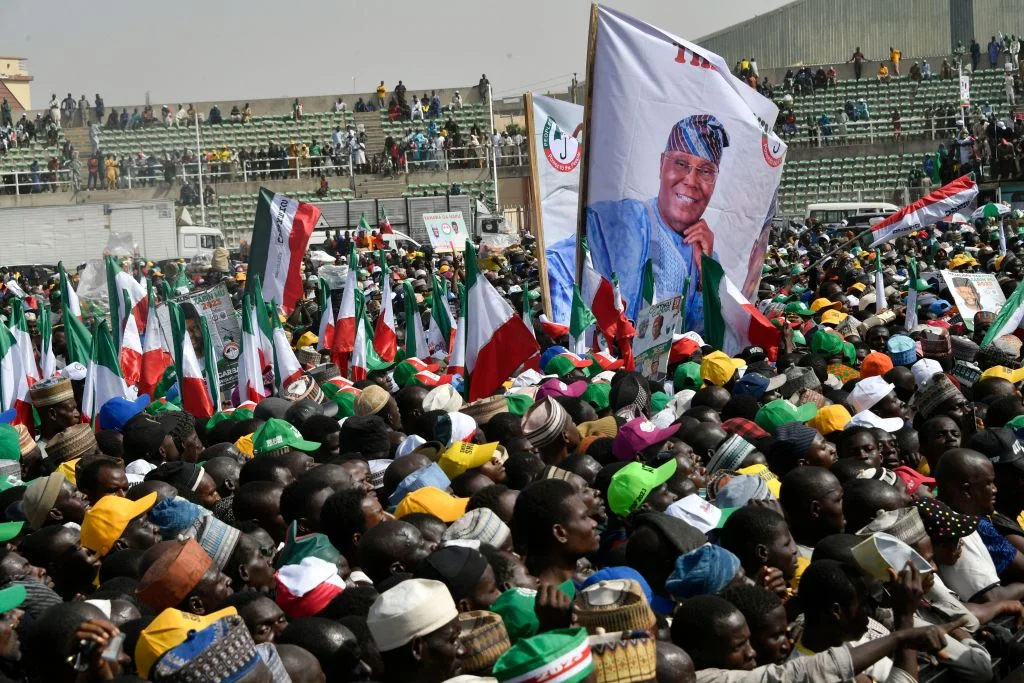Nigeria—Africa’s most populous country, largest economy, and top oil producer—will hold a presidential election on Saturday February 25. Incumbent president Muhammadu Buhari, now finishing his second four-year term, is ineligible to run for re-election.
Even if he could run, he probably wouldn’t win. Africa’s largest economy, still recovering from a COVID-19 shock that triggered the country’s second recession in just five years, continues to struggle. Inflation reached 21.5% at the end of 2022. The unemployment rate stands at 33 percent for all adults and 42.5% for young adults.
Some 40 percent of the country’s 221 million people live below the poverty line, according to The World Bank last March, and “many Nigerians—especially in the country’s north—also lack education and access to basic infrastructure, such as electricity, safe drinking water, and improved sanitation.” The value of the naira, Nigeria’s currency, plunged last year as oil theft, a chronic problem in Nigeria’s south, took a bite out of the country’s oil exports. A plan to replace old banknotes with new ones has gone completely off the rails this week, leading to cash shortages, protests, vandalism of bank buildings, and fights at ATMs. Acute fuel shortages for consumers have also set voters’ teeth on edge. Corruption remains endemic.
The now 13-year insurgency of terrorist group Boko Haram continues to wreak havoc in the country’s northeast. There are secessionists in the southeast, led by the Indigenous People of Biafra, who are accused of most of the dozens of attacks aimed at election workers and facilities over the past four years. Well-armed criminal gangs commit crimes in multiple regions.
For all these reasons, the stakes in this election are high. According to the country’s constitution, the candidate with the most votes who also earns at least 25% of the votes in two-thirds of Nigeria’s 36 states will be declared the winner. If no candidate meets that threshold, the top two candidates then face off in a second round of voting within three weeks.
The candidates
There isn’t much reliable independent polling in Nigeria, but of the 18 candidates in this election, just three have a real chance to win.
Bola Ahmed Tinubu, the former Lagos governor, represents the governing All Progressives Congress (APC). Tinubu is widely considered the favorite to win, mainly because he’s an experienced politician with 21 ruling party governors who can make his case locally and enough campaign cash to outspend his rivals on advertising.
But he also faces big challenges. He has to find ways to distance himself from the unpopular incumbent Buhari without alienating the president’s supporters. The 70-year-old Tinubu has also battled rumors that he suffers from a neuro-generative disorder that can slur his speech, though he denies this.
Atiku Abubakar, known widely simply as Atiku, will represent the main opposition People’s Democratic Party (PDP). He served as vice president under Olusegun Obasanjo from 1999 to 2007, but he has failed in five previous attempts to win the top job.
The now 76-year-old candidate has offered himself as a unifier in a country polarized by regional, religious, and ethnic divisions. Atiku’s biggest advantage appears to be that he shares a cultural and religious identity with voters in Nigeria’s Muslim northeastern and northwestern state, regions which account for almost 40% of Nigeria’s 96 million registered voters.
Peter Obi is a wealthy businessman who will represent the little-known Labour Party, which remains outside Nigeria’s traditional political elite. The mainstream frontrunners, Tinubu and Atiku, don’t offer clearly defined ideological agendas, allowing Obi to argue that the choice between them is simply between old political tribes over who controls the lion’s share of the country’s wealth. Obi’s biggest challenge will be to persuade enough voters that the outsider really can win. In fact, Obi served as Atiku’s vice-presidential running-mate in 2019, and was a member of Atiku’s PDP until last year. The only major Christian candidate, Obi enjoy politically potent support from churches across the country.
As in other countries, the role of outsider is a double-edged sword. It increases Obi’s appeal among young voters and all those hungry for “throw the bums out”-style change. But it also leaves his campaign without familiar faces to act as surrogates, and some voters may fear that a party with few seats in the legislature and few established ties with the country’s powerful state governors won’t be able to accomplish much.
The outcome
The race remains competitive and highly unpredictable. It’s easy to be cynical when the national economic and security problems detailed above headlines the last several elections. But three-quarters of those registered to vote in this election are between the ages of 18-49. That should worry the septuagenarian frontrunners and their establishment political parties. Yet, Obi and other outsiders will have to prove they can inspire these younger voters to the polls. Turnout at the last election (2019) was just 35%. It should take about five days to count the votes and report the results.

